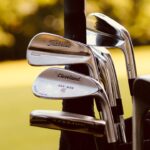- 7 Top Flite Golf Clubs XL for Improved Performance - September 28, 2024
- Top Flite Golf Clubs: Top 5 Reasons to Choose Them - September 28, 2024
- Top 3 Golf Club Fitters for a Perfect Swing - September 28, 2024
You're likely aware that using illegal golf clubs can result in disqualification, penalty strokes, and even loss of amateur status, with the United States Golf Association (USGA) rigorously enforcing its rules to guarantee fair play and maintain the integrity of the game. Illegal clubs often feature oversized heads, non-traditional materials, and spring-like effects, violating USGA standards. Detecting these clubs involves X-ray analysis, spot checks, and regular testing procedures. Understanding the characteristics of non-conforming equipment, the consequences of using them, and the available legal alternatives can help you make informed decisions about your gear – and exploring these topics further can reveal even more about the complex world of golf equipment.
Key Takeaways
- Illegal golf clubs violate USGA regulations, resulting in penalties, disqualification, and loss of amateur status.
- Non-conforming clubs often feature oversized heads, adjustable weights, and non-traditional materials that exceed USGA standards.
- The use of illegal clubs undermines competitive integrity, fair play, and the reputation of golfers who use them.
- Advanced technologies like X-ray analysis and spot checks are used to detect and test illegal clubs during tournaments.
Illegal Golf Clubs Explained
When you step onto the golf course, it's vital to verify that the clubs in your bag meet the strict regulations set by the United States Golf Association (USGA), as failing to do so can result in severe consequences. You must make certain that your clubs aren't illegal to use, as defined by the USGA.
This means avoiding clubs with oversized clubheads, non-conforming grooves, and adjustable weight systems. For instance, the Juggernaut XXL driver with its 515cc head size and the MAZEL Sand Wedge with its USGA-noncompliant grooves are both illegal.
Additionally, clubs with a coefficient of restitution (COR) exceeding 0.83, like the Callaway E.R.C. II, provide significant distance gains but are deemed illegal for competitive play.
It's important to understand that using illegal clubs can lead to disqualification, loss of amateur status, and damage to your reputation.
Stay informed about conforming clubs through the USGA's regular updates and weekly lists of approved drivers to avoid any issues on the course.
Non-Conforming Equipment Overview
Delving into the world of non-conforming equipment, you'll find that it encompasses a range of clubs featuring innovative designs and materials that, unfortunately, don't meet the USGA's stringent standards. These clubs may look appealing, but they're illegal for competitive play.
Here are some key characteristics of non-conforming equipment:
- Adjustable weights, oversized heads, and non-traditional materials that don't comply with USGA regulations
- Clubs with spring-like effects or non-conforming grooves, such as U-shaped grooves in wedges
It's vital to understand what constitutes non-conforming equipment, as using illegal clubs can lead to severe penalties, including disqualification from tournaments and loss of amateur status.
To avoid this, the USGA regularly updates its list of conforming equipment, helping players make informed decisions when choosing their clubs. By being aware of what's allowed and what's not, you can ascertain you're playing with legal equipment and avoiding any potential consequences.
Impact of Illegal Equipment on Play
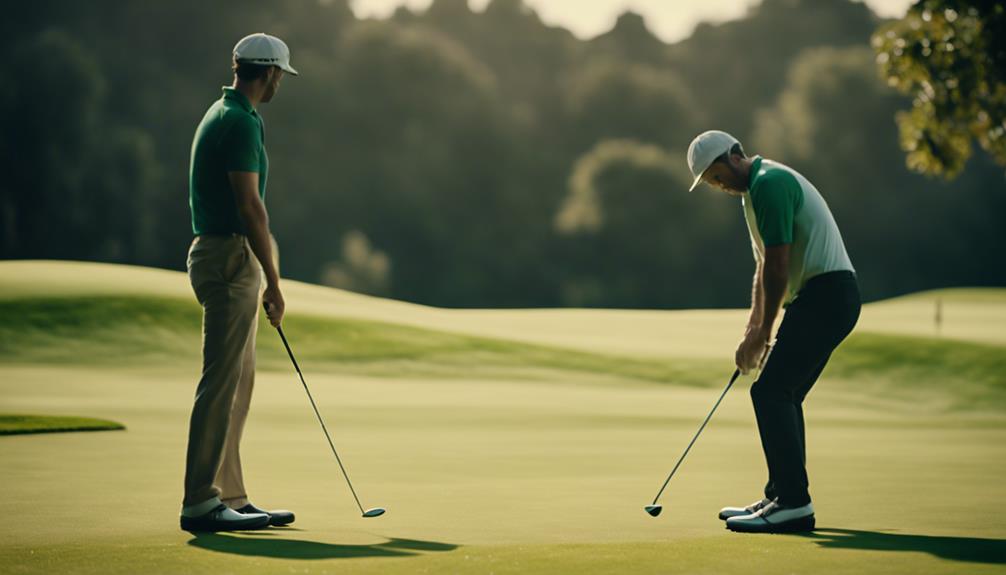
As you step onto the green, you're likely aware that using illegal golf clubs can have serious repercussions on your game.
But have you considered the full extent of the consequences, from penalties and fines to damage to your reputation and career?
Penalties and Consequences
You'll face severe penalties if you're caught using illegal golf equipment, including disqualification from tournaments and added strokes to your score. These consequences can be devastating to your golf career, impacting your eligibility to compete at higher levels and tarnishing your reputation.
Here are just a few of the penalties and consequences you may face:
- Disqualification from tournaments, resulting in the loss of prize money and recognition
- Additional strokes added to your score, potentially changing the outcome of the game
It's not just the immediate penalties that should concern you – the use of illegal golf clubs can also lead to public scrutiny and damage to your reputation. Organizations governing golf, such as the USGA, conduct random checks and testing at tournaments, increasing the chances of detection and subsequent penalties.
With the risks so high, it's crucial to verify your golf clubs conform to the rules, avoiding the severe penalties and consequences that come with using illegal equipment.
Fair Play Concerns
When you step onto the course with illegal golf clubs, you're not only jeopardizing your own reputation but also undermining the very fabric of fair play, which is the cornerstone of competitive golf. The use of non-conforming equipment, such as an oversized golf driver, provides an unfair advantage, disrupting the balance of competition. This raises concerns about the integrity of the game, as players who use illegal clubs may gain an edge over their opponents.
| Consequence | Impact on Fair Play | Effect on Player |
|---|---|---|
| Disqualification | Loss of trust among competitors | Damage to reputation |
| Penalty Strokes | Skewed competition results | Increased score |
| Loss of Amateur Status | Ineligibility for future competitions | Impact on sponsorship opportunities |
| Public Scrutiny | Erosion of game's integrity | Long-term damage to reputation |
The presence of illegal equipment in play can lead to a range of consequences, from disqualification to public scrutiny. As a result, it's crucial to verify that your golf clubs conform to the rules, maintaining the integrity of the game and upholding the principles of fair play.
Detection and Testing of Illegal Clubs
Golf's governing bodies, the R&A and USGA, employ advanced technologies, including X-ray analysis, to meticulously examine the internal structure and materials of golf clubs. This ensures that manufacturers and players alike adhere to the rules of the game. As you explore the world of golf, you'll realize that detection and testing of illegal clubs are essential aspects of maintaining the game's integrity.
Spot checks are conducted during tournaments to identify any players using non-conforming clubs, maintaining the integrity of the competition.
Professional tours have increased scrutiny on the equipment used by players, incorporating random testing procedures to uphold compliance.
The USGA publishes a weekly list of conforming drivers and equipment, which is essential for golfers to reference in order to avoid using illegal clubs.
Legal Alternatives for Golfers
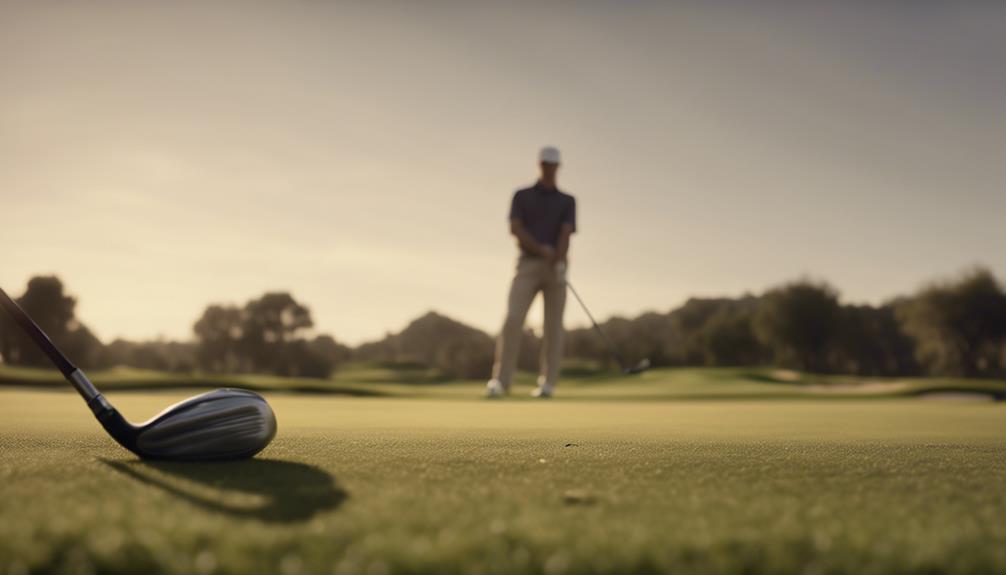
Embracing legal alternatives, golfers can confidently select from a range of conforming equipment options that meet USGA regulations, guaranteeing a fair and enjoyable game. You can choose from high-quality clubs like the BombTech 52-degree wedge, designed for peak performance while adhering to USGA rules. Staying updated on rule changes and USGA compliance lists is essential to guarantee you're using conforming clubs during play. Regular equipment checks and consultations with golf professionals can help you identify and maintain legal gear for both casual and competitive play.
| Legal Alternative | Key Feature | Benefit |
|---|---|---|
| BombTech 52-degree wedge | Enhanced performance | Improves gameplay without compromising rules |
| Regular equipment checks | Identifies non-conforming clubs | Guarantees fair play and avoids penalties |
| Consultations with golf pros | Expert guidance on club selection | Helps develop skills and confidence |
| USGA compliance lists | Stay updated on rule changes | Avoids accidental use of illegal clubs |
| Affordable conforming clubs | Accessible to all skill levels | Promotes fair play and inclusivity |
Illegal Clubs and Their Consequences
Using illegal golf clubs can lead to severe repercussions, including disqualification, penalty strokes, and even legal consequences, which can tarnish your reputation and hinder your progress in the golfing world. As a golfer, it's vital to understand the risks associated with using non-conforming equipment.
Here are just a few of the consequences you could face:
- Disqualification from tournaments, damaging your competitive standing and reputation.
- Loss of amateur status, restricting your future participation in amateur events.
The repercussions of using illegal clubs extend beyond the course. You may face public scrutiny and damage to your reputation within the golfing community, and even legal consequences, including fines and suspensions from play.
It's imperative to verify that your equipment meets the necessary regulations to avoid these consequences. Remember, using illegal clubs can have long-lasting and far-reaching effects on your golfing career.
USGA Regulations on Golf Equipment
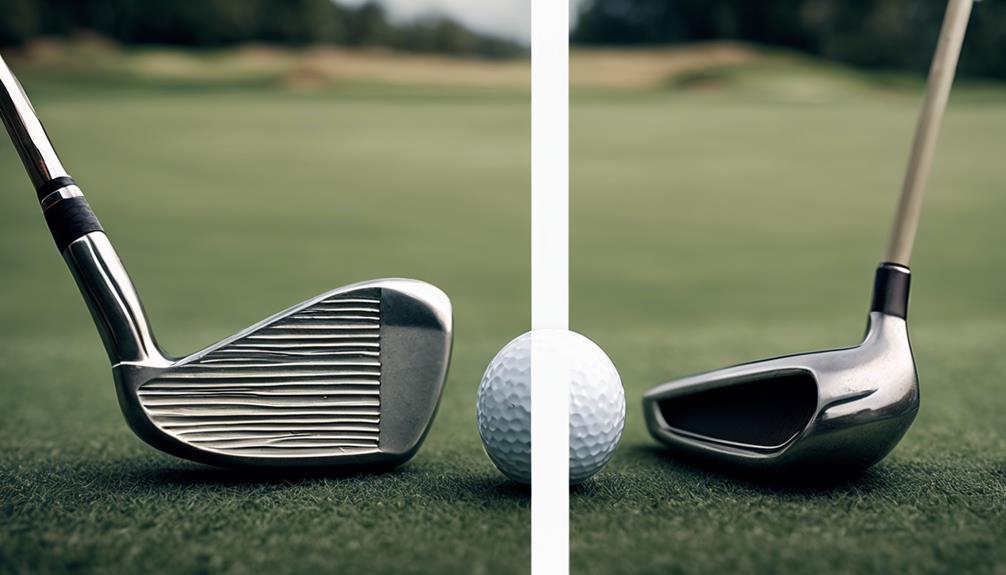
As you prepare for your next tournament, it's vital to understand that the United States Golf Association (USGA) establishes and enforces strict rules governing the design and specifications of golf equipment to assure a level playing field in competitive play.
These USGA regulations on golf equipment guarantee that every player has an equal opportunity to succeed. The rules prohibit the use of non-conforming clubs, which can't be used in professional tournaments or for maintaining amateur status.
Manufacturers must submit their equipment for approval by the USGA before it can be sold, guaranteeing compliance with established standards. The USGA regularly updates its list of conforming clubs, publishing it weekly to inform players and manufacturers of legal equipment options.
You should be aware that non-compliance with USGA regulations can lead to disqualification from tournaments and damage to a player's reputation. Even your golf ball must meet USGA standards, so it's important to choose a ball that's on the conforming list.
Performance Benefits of Illegal Clubs
One key advantage of illegal clubs is that they can deliver significant performance gains, particularly regarding distance, forgiveness, and spin control, thanks to their non-conforming design features. As you consider using illegal clubs, you'll notice improvements in your game due to their unique characteristics.
Here are some benefits you can expect:
- Increased distance: Illegal clubs often feature a coefficient of restitution (COR) greater than 0.83, resulting in longer drives.
- Enhanced forgiveness: Larger head sizes and non-traditional designs allow for better off-center hits and improved overall performance.
Keep in mind that while illegal clubs can offer these benefits, they may not be suitable for competitive play due to their non-conforming nature.
However, for casual players or those looking to improve their skills, illegal clubs can be a valuable tool in your golfing arsenal.
Examples of Non-Conforming Clubs
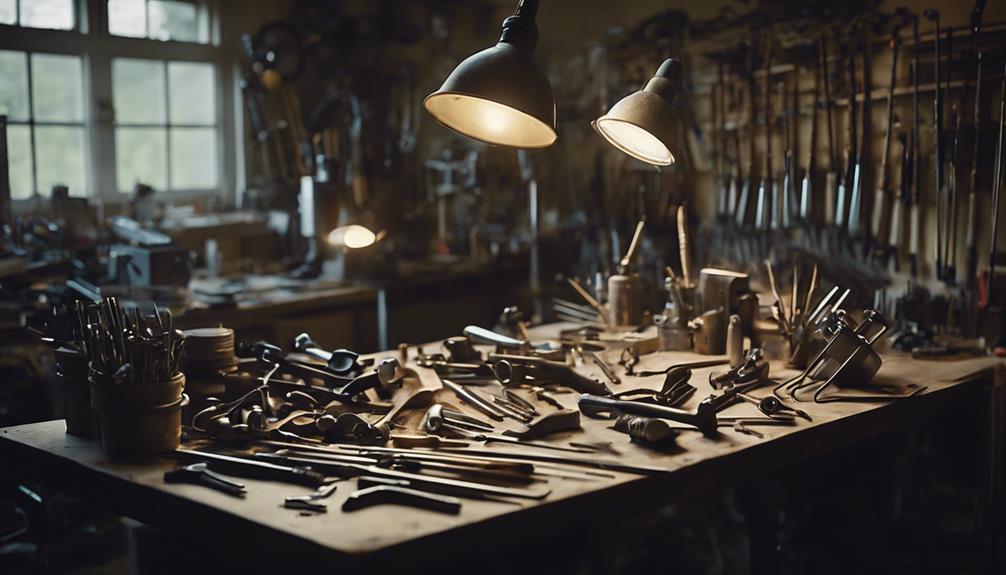
As you explore the world of illegal golf clubs, you'll come across several examples of non-conforming clubs that violate USGA regulations.
These clubs often feature design elements that exceed legal limits, providing an unfair advantage on the course.
Let's take a closer look at some specific examples, including the Juggernaut XXL driver and the Bridgestone Tour Stage V800, to understand what makes them non-conforming.
Non-Conforming Club Features
Beyond the boundaries of USGA regulations, you'll find drivers like the Juggernaut XXL, Bridgestone Tour Stage V800, Callaway's E.R.C. II, Diamond Tour Felon 2.0, and Nike's Covert VRS, each boasting features that catapult them into the domain of non-conforming clubs.
These clubs' non-conforming features are what set them apart from their conforming counterparts. Here are a few examples:
- Massive head size: The Juggernaut XXL's 515cc head size exceeds the USGA's 460cc limit, providing a larger sweet spot and increased forgiveness.
- Illegal curvature: The Bridgestone Tour Stage V800's sole curvature enhances performance but violates USGA regulations, making it a non-conforming club.
These features may provide an edge on the course, but they come at the cost of being non-conforming.
As a golfer, it's vital to understand what makes a club non-conforming to guarantee you're playing with equipment that meets USGA regulations.
Illegal Club Examples
You'll encounter a range of drivers that flaunt their non-conforming status, including the Juggernaut XXL, Bridgestone Tour Stage V800, Callaway's E.R.C. II, Diamond Tour Felon 2.0, and Nike's Covert VRS, each with distinct features that set them apart from their conforming counterparts.
Here's a breakdown of these illegal club examples:
| Club | Non-Conforming Feature | Reason for Disqualification |
|---|---|---|
| Juggernaut XXL | Head size (515cc) | Exceeds USGA limit (460cc) |
| Bridgestone Tour Stage V800 | Illegal curvature on sole | Alters performance characteristics |
| Callaway's E.R.C. II | Coefficient of Restitution (COR) | Exceeds legal limit (0.83) |
| Diamond Tour Felon 2.0 | Head size (485cc) | Classified as non-conforming due to dimensions |
| Nike Covert VRS | Coefficient of Restitution (COR) | Surpasses allowed limit (0.83), providing unfair advantage |
These drivers have been deemed illegal due to their non-conforming features, which give players an unfair advantage. Understanding these examples can help you make informed decisions when choosing your golf clubs, ensuring you're playing with conforming equipment that meets the rules of the game.
Considerations for Using Illegal Clubs
When deciding whether to use illegal clubs in casual play, golfers must carefully weigh the potential benefits against the risks of being disqualified, losing amateur status, and damaging their reputation.
While using illegal clubs can offer you the opportunity to experiment with enhanced performance features, you must consider the consequences of getting caught.
Here are some key factors to keep in mind:
- Risks of disqualification and loss of amateur status: Using illegal clubs in competitive play can lead to severe penalties, including disqualification and loss of amateur status.
- Impact on recorded scores and handicaps: Using non-conforming clubs can negatively impact your recorded scores and official handicaps, potentially affecting your competitive standing.
History of Banned Golf Clubs
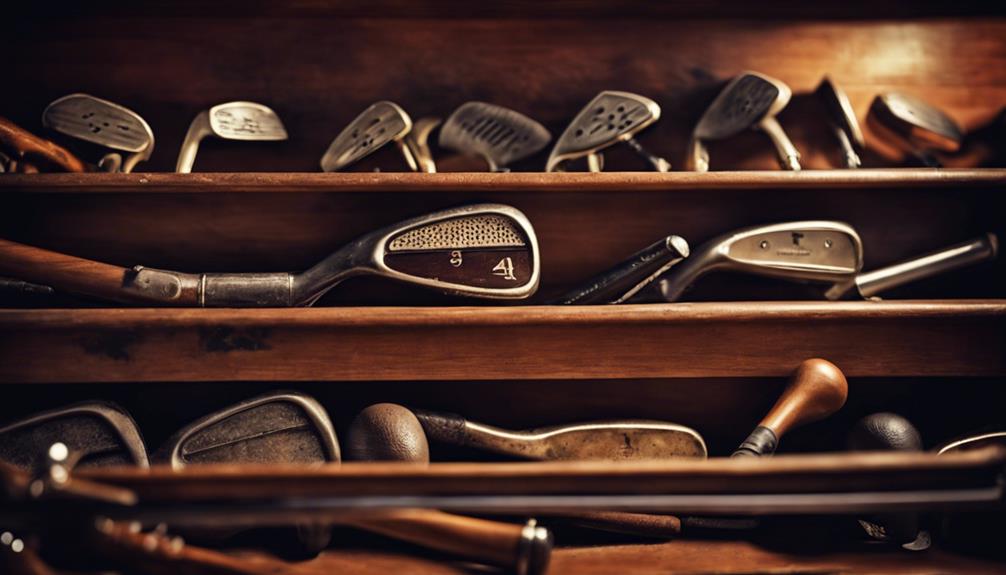
As you explore the history of banned golf clubs, you'll discover that innovations like the Schenectady putter and anchor putter were once deemed illegal due to concerns over unfair advantages.
The evolution of golf rules has led to the prohibition of these clubs, shaping the game into what it's today.
Banned Club Innovations
Golf's governing bodies have been vigilant in policing equipment innovations, banning clubs that push the boundaries of fair play and rules, thereby shaping the history of banned golf clubs.
As you explore the world of banned club innovations, you'll discover that some designs have been deemed too radical, offering unfair advantages to players.
- The Schenectady putter, with its modified design, was banned in 1910 for conflicting with the Rules of Golf.
- Adjustable weight clubs and oversized clubheads were also prohibited due to their potential to enhance performance beyond regulatory limits.
These banned club innovations have led to a more refined understanding of what constitutes fair play in golf.
By examining these innovations, you'll gain insight into the delicate balance between technological advancements and the spirit of the game.
The governing bodies' efforts have guaranteed that golf remains a game of skill, strategy, and sportsmanship, rather than a showcase of technological superiority.
Evolution of Golf Rules
You'll find that the evolution of golf rules has been shaped by the need to address innovations that have pushed the boundaries of fair play, leading to a rich history of banned golf clubs that have influenced the game's development over time.
The Rules of Golf have been constantly refined to maintain the integrity of the sport.
Take, for instance, the Schenectady putter, which was banned in 1910 due to its design changes that violated the Rules of Golf. It remained banned until the early 1950s.
Similarly, the British ball was banned in 1990, leading to significant shifts in equipment regulations regarding golf balls.
The introduction of the non-conforming grooves rule in 2010 resulted in the banning of U-shaped grooves in wedges to maintain fair play and consistency across the sport.
More recently, the anchor putter was officially banned by the USGA in 2016, following concerns over its use providing an unfair advantage to players.
Throughout history, the USGA has regularly updated equipment regulations to prevent manufacturers from finding loopholes that could compromise the game's integrity.
Frequently Asked Questions
What Is an Illegal Club?
You need to understand that a golf club is illegal if it fails to meet the Club Regulations set by the USGA and R&A, specifically concerning groove dimensions, adjustability, size, and material composition.
Are Ping Eye 2 Legal?
You're wondering if the Ping Eye 2 is legal, like a detective searching for clues. To clarify, Ping Eye 2 clubs aren't legal for tournament play due to their non-conforming grooves, but they're okay for casual play, so you can still use them, just not in competitions.
What Is an Illegal Wedge in Golf?
You're likely wondering what makes a wedge in golf illegal; it's the wedge design, specifically non-conforming grooves like U-shaped ones, that enhance friction but don't meet USGA specs, giving unfair advantages in spin control and debris channeling.
What Is a Non-Conforming Golf Club?
As you step onto the lush green, remember that a non-conforming golf club is like a wolf in sheep's clothing, hiding performance-enhancing features that can secretly boost your game, but ultimately lead to disqualification, tarnishing your reputation.
Conclusion
As you've explored the world of illegal golf clubs, you might be tempted to join the ranks of those who take a chance on non-conforming equipment.
But, ironically, the pursuit of an unfair advantage might just cost you the one thing that makes golf great – the integrity of the game.
So, go ahead, try to cheat your way to a lower score, but don't be surprised when the thrill of victory is overshadowed by the shame of getting caught.

